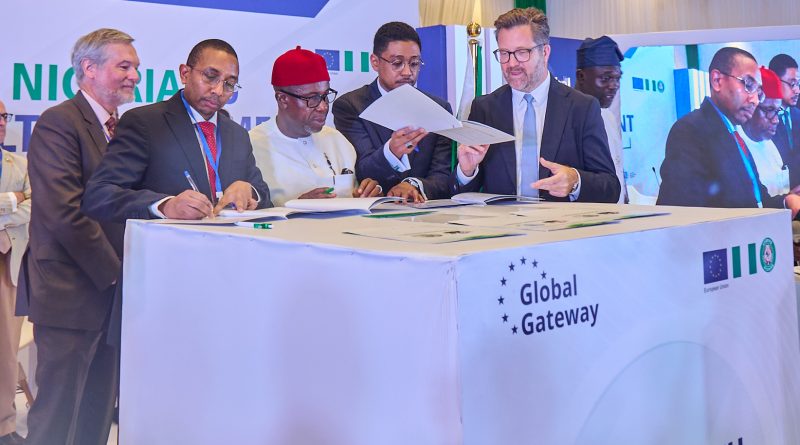Nigeria, EU sign agreements to boost local manufacturing, health investments
The Nigerian government has signed three major agreements with the European Union (EU) and the Economic Community of West African States (ECOWAS) to strengthen local manufacturing, stimulate investment, and promote reproductive health in Nigeria and the West African region.
The agreements, signed on Thursday at the Nigeria–EU Health Investment Forum in Abuja, are part of the EU’s Global Gateway Manufacturing and Access to Vaccines, Medicines and Health Technologies (MAV+) and Sexual and Reproductive Health and Rights (SRHR) initiatives.
They include the Enabling Local Manufacturing of Health, Immunisation and Nutrition Commodities in Nigeria (ELM-N), Quality Uplift for Advancing Local Industry in Medicine Standards (Qualimeds Nigeria), and Strengthening SRHR in West Africa programmes.
Commitment to health sector reform
At the event, Vice President Kashim Shettima, represented by his Senior Special Assistant on Public Health, Uju Rochas, said the signing of the agreements reaffirms the current administration’s resolve to build a sustainable, inclusive, and innovation-driven health economy.
Mr Shettima explained that President Bola Tinubu’s Executive Order on the local production of pharmaceuticals and medical devices marked a turning point in Nigeria’s effort to strengthen the health sector.
“Through the Presidential Initiative for Unlocking the Healthcare Value Chain (PVAC) and complementary frameworks such as the Sector-Wide Approach (SWAp), this administration has taken concrete steps to strengthen health governance, stimulate investment, and promote local manufacturing,” he said.
He added that the government is committed to creating an enabling environment for investors and innovators through predictable regulations, strong institutions, and public–private collaboration.
EU pledges continued partnership with Nigeria
The EU Ambassador to Nigeria and ECOWAS, Gautier Mignot, said the forum reflects Team Europe’s commitment to improving health systems through strategic investment and collaboration.
Mr Mignot said that by working alongside Nigerian authorities, the United Nations, the wider international community, and the private sector, robust, resilient, and efficient health and social welfare systems must be built to ensure prosperity for all.
He noted that the EU has been a long-standing partner of Nigeria and ECOWAS in improving access to health services, immunisation, medical research, and family planning, both through in-country programmes and contributions to multilateral platforms.
“We continue to support Nigeria through our Global Gateway initiatives, particularly in reproductive health, maternal and child health, where we have ongoing projects worth €45 million in Nigeria and nearly €25 million across West Africa,” he said.
According to him, upcoming initiatives will also focus on digital health and public health systems, while promoting a shift from aid dependency to peer-to-peer collaboration and long-term investment.
Mutual prosperity’ for Nigeria and EU
In his remark, the Minister of Budget and Economic Planning, Abubakar Bagudu, said the agreement is timely as Nigeria is implementing reforms to strengthen partnerships and expand investments aimed at making healthcare accessible and affordable.
Mr Bagudu said the discussion centred on mutual prosperity and shared gains, supported by the strength of both economies and their demographic advantages, adding that even amid competing blocs, the EU and Nigeria can succeed together because of the enormous absorptive capacity of Nigeria’s economy.
He commended President Tinubu for taking “bold and sometimes difficult decisions” to place the economy on a more sustainable path.
READ ALSO: Experts call for data-driven policies to build resilient health systems in Africa
Local manufacturing as a strategic health priority
The Minister of Health and Social Welfare, Muhammad Pate, represented by the Director of Food and Drug Services at the ministry, Olubunmi Aribeana, said Nigeria is determined to ensure that locally made health products meet international standards and serve not only Nigerians but the broader West African region.
Mr Pate explained that the Renewed Hope Health Agenda is anchored on three key pillars: strengthening local production of pharmaceuticals, expanding access to essential medicines and vaccines, and advancing SRHR.
“Local production of health commodities is not merely an economic choice; it is a strategic health security priority,” he said.
“By scaling up domestic manufacturing of medicines, diagnostics, vaccines, and other health technologies, Nigeria is taking concrete steps toward achieving universal health coverage.”
Investment and innovation
The Nigeria–EU Health Investment Forum was jointly organised by the EU Delegation to Nigeria and ECOWAS, the Presidential Initiative for Unlocking the Healthcare Value Chain (PVAC), and the National Institute for Pharmaceutical Research and Development (NIPRD).
Participants at the forum said the signing of the agreements marks the beginning of a new phase of collaboration, driven by shared prosperity, technology transfer, and local innovation across Nigeria and West Africa.

